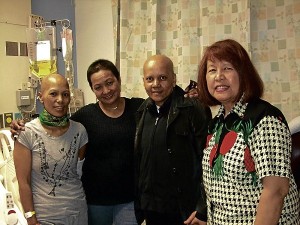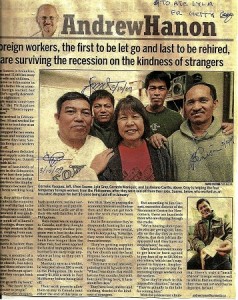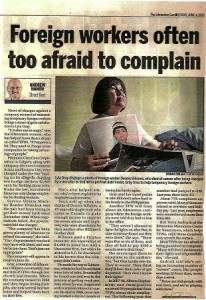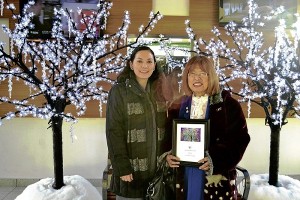Celebrating the kindness of strangers
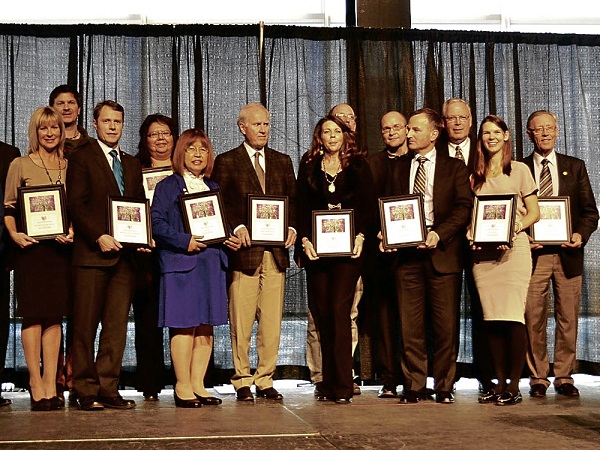
FIRST FILIPINO AWARDEE Lyla Gray (front row, third from left), the first member of the Filipino community to be recognized for her charity work, joins other awardees in the Social Services Category during National Philanthropy Day celebrations in Edmonton, Canada, on November. 16.
EDMONTON, ALBERTA, Canada—She invited me to have dinner at her place. She said the best time to visit her was a Thursday. She lives close to a Filipino restaurant, she explained, and Thursday is buffet day. All leftover food is given to her since the owner knows she accommodates and feeds people in need.
So one Thursday evening I visited her. There were only two of us at the dining table but there was food enough for one big family. (Some Thursdays though when business is brisk at the restaurant, she doesn’t get any.)
She is the very first philanthropist I have met in my life. Our paths crossed by chance at the funeral of four Filipino car crash victims last March. I asked if I could write a story about her. She declined at first. “Story about me? I’m nobody in society. I’m not a politician. I’m just an ordinary next-door person.”
“That,” I told her, “is the very reason why I want to write something about you.”
A few days later, she said, “go ahead.”
Her name is Lyla Gray, a member of the Edmonton Filipino Seventh-Day Adventist Church. She moved to town 44 years ago when Filipinos numbered only about 300. There are 22,000 today. She has lived here ever since. Now 66 years old, she has seen the city grow. She remembers the first high-rise buildings downtown.
Ilocano migrant
Lyla hails from Candon, Ilocos Sur—the youngest of three children of Ester Abaya and writer Benjamin A. Gray, one of the pre-war staff members of the Ilocano magazine Bannawag and author of an early biography of the late President Ferdinand Marcos entitled “Rendezvous with Destiny.”
When the family hit hard times over a long court case, Lyla in 1968 moved to Canada. “We became so poor … we hardly had anything to eat,” she said.
Lyla got a job as a secretary to the director of food services at the Edmonton General Hospital and worked there for over 17 years. She’s retired now.
But unlike other immigrants who have lived in Canada for more than a decade, Lyla has not been able to acquire a house. She lives in an apartment. For a long time, she supported her parents and aunts. Now, she says, “my extra money goes to the needy.”
Someone to call
She helps without boundaries. She accommodates strangers in her home or she goes out of her way to visit people in need. People knock on her door asking for shelter and food. They are usually referred to her by friends or they have simply heard about her charity work.
The last 10 years, she remembers about 20 emergency house guests—some stayed a couple of weeks; some up to 10 months.
Many Filipino caregivers who arrive in town for the first time go to Lyla for guidance. A caregiver whose employer’s house burned down the day before her arrival, ended up staying with Lyla for a week.
A family who landed in Canada not knowing anybody in town was referred to her. They had moved to an apartment but had nothing inside the place. They slept on the floor. Lyla sent an e-mail to the Filipino community asking for any reusable spare furniture. In just a few days, the family received many donations, from kitchen utensils to bedroom apparel and toiletries. They received so many things that they had to tell people they didn’t want to receive anything more.
“I didn’t provide those things. My role was simply to disseminate the information,” Lyla said.
Like an institution
I asked how these people reach her. She said usually people in need go to a Filipino church or organization. Then her name would be given out— like an institution.
“Some nights, I would get calls asking if my number is the Philippine Embassy. Some days, people call asking what the weather is like or what bus number to take to this or that place.”
I asked: Don’t you feel inconvenienced by all these?
She was quick to answer. “I think I was born to help. I notice that when I do, I have lots of energy.”
One particular story that moved me was about Ana (not her real name), a cancer survivor. She was working as a hairstylist when she was diagnosed with cancer. Ana, also burdened with credit card debts not her own, ended up staying with Lyla for eight months. Ana is now on her own but she visits Lyla often.
Surviving recession
When Alberta slid into recession in 2008, Lyla was not exempted from the crisis. Still, she let four overseas Filipino workers camp in her living room for months.
One day, a reporter picked up the story. The headline of the Edmonton Sun page read: “Foreign workers, the first to be let go the last to be rehired, are surviving the recession on the kindness of strangers.” The article was printed with a picture of Lyla and the guys. It also mentioned her contact address.
Right after the publication of that story, her phone rang day and night. She received more than a hundred calls. “I felt
like a recruitment agent,” she quipped.
People called asking where to find work and how to renew their work permits. But the calls that hit her were from people needing food. They had lost their jobs.
Feeding the hungry
Lyla e-mailed her contacts in the Filipino community asking for food donations. The response was overwhelming. She ended up picking up food from different homes and delivering them to the families in need in different parts of the city.
Lyla’s charity work does not stop with co-Filipinos. She has helped Canadians as well. There was an 81-year-old man, Bob (not his real name), who befriended Lyla in church. She would accompany the old man to the grocery store, to the bank, to church and to his doctor’s office. When Bob died at 90, Lyla was the first person the nursing home phoned. Lyla called his family but they didn’t seem concerned. So Lyla arranged his
funeral.
A few months after Bob’s death, she was surprised to find out that he had named her as his next-of-kin beneficiary. She received a $2,500 death benefit.
Some rotten tomatoes
I asked if she had ever been taken advantage of. “Oh yes, but rarely,” she said. Then? “Then I kick them out,” she said grinning. “I know there’s always a rotten tomato somewhere.”
Once, a Canadian knocked at her door saying he had been evicted and had no place to stay for the night. He stayed eight months although he offered her $400 monthly rent. But Lyla suspected he was a drug addict and didn’t like the people with pierced rings all over their faces who came to visit him. On two occasions, she caught him with a woman in her apartment. She asked him to leave. When he insisted on staying, she called the police.
There was another one. She once accomodated a mental patient who became unruly. Lyla had to call the Mental Health Crisis Team to help her deal with the patient.
Yet despite bad experiences, she hasn’t stopped opening her door to needy strangers. Some of them pay a small amount in rent but most don’t.
One day she housed a mother with a four-month-old baby. Lyla gave them a ride every morning and picked them up in the afternoon. This went on for 10 months. When the baby turned one, Lyla gave him a grand birthday party. When the baby’s mother finished her upgrading studies, she was able to move out of Lyla’s place. Lyla missed the baby so much that she visited him at the day care center almost everyday.
Eventually, mother and son moved out of town. She has not heard from them since. Not a call, not an e-mail, nothing. “Aren’t you hurt?” I asked. “Yes I am. But people are different, so I just let go of the ill feelings. And move on.”
Helping the dying
In April 2010, a Filipino worker named Roman was hit by a truck while he was going home on his bike. Roman didn’t have family in Canada so Lyla went to the morgue to identify his body. One e-mail from Lyla and the Filipino community coughed up a $25,000 donation. Part of the money was used for the funeral and to cover expenses in sending the body back to the Philippines. She sent the remaining amount to Roman’s family.
Once, she flew to the Philippines to bring back the urn of ashes of another foreign worker who died in Canada. Let’s call him Danilo. He came to Canada to work as a caregiver but died a few months later due to colorectal cancer. A few days before his death, he spoke to Lyla. He handed her an envelope containing money which he had kept under his pillow at the hospital, and requested her to send it to the Philippines for the education of his nieces and nephews. Lyla opened the envelope and found $5,000 inside.
She volunteered to bring Danilo’s urn to the Philippines herself, using her travel points. “I knew those points were reserved for something,” she mused.
When she arrived at Danilo’s place, she was stunned to see the poor living conditions of the family. They needed decent shelter. So aside from the $5,000 that Danilo saved, some donations from the Filipino community were used for the renovation of the house.
No fears
For Lyla, Edmonton is her home. “I will die here,” she said.
“But you don’t have a family here,” I said. “The people I have helped, they are my family. I know someday, somebody will also take care of me.”
“What’s special about Edmonton?” I asked. “It’s not about Edmonton per se, it could be anywhere that God puts me. Coincidentally, He put me here.”
“Are there days when you’re alone?” I asked.
“Very rarely, and it doesn’t seem normal to me.” One day, eight caregivers who just needed a break from work spent the night with her. All of them ended up sleeping in the living room—like a pajama party.
The real blessing
“How about blessings, do you get any?” I asked. She smiled, her face glowed: “Oh, as soon as they get stable jobs, they buy me groceries. Some give me gift cards. Somebody dyes and trims my hair for free. I get free manicure. Those who stay with me cook and clean my place. Those who now live out of town invite me out for dinner when they’re in the city. Last time I went to the Philippines, I was invited by a family that I had helped … I was treated like royalty.”
“Is that enough compensation?” I asked. “No,” she said, “that’s just icing on the cake. The blessing I really get is good health and fulfillment in my heart. I sleep with a smile on my face.”
I asked what is her message to the readers of this story. “We are all brothers and sisters … We all have the same Heavenly Father.”
***
On Nov. 16, Lyla became the first Filipino to be included among the individuals and organizations honored during Edmonton’s “National Philanthropy Day.” Sponsored by the city’s Association of Fundraising Professionals, the event is an annual awards luncheon to celebrate the spirit of giving and “to take the opportunity to say ‘thank you’ to those who help make our community a great place to live!” Over 600 local officials, business leaders, civic organization leaders and residents attended this year’s affair.











